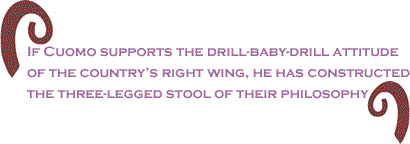The
warnings have been sounded for decades to anyone who would
listen, but few have been listening.
 There�s
the melting of the ice in the north, there are fewer fish
in the sea for commercial fishing, the coral reefs are receding,
the climate is warming and changing, there is an unprecedented
rate of extinction of species that has not been seen since
the dinosaurs, and people have untold quantities and varieties
of toxins in their bodies. There�s
the melting of the ice in the north, there are fewer fish
in the sea for commercial fishing, the coral reefs are receding,
the climate is warming and changing, there is an unprecedented
rate of extinction of species that has not been seen since
the dinosaurs, and people have untold quantities and varieties
of toxins in their bodies.
They
are being sickened by what�s in our environment - what we
eat, drink, and breathe in - and, thus, we have a health
care crisis. It�s a political argument played out at the
national level, but Americans (or at least, their representatives)
can�t seem to find the will to provide health care for everyone,
as a right.
We
have wide-ranging international discussions about the loss
of rain forests in both the Western Hemisphere and in Asia.
We have discussed what it means to have millions fewer acres
of tropical forests to take the carbon dioxide out of the
air we breathe and give us life-giving oxygen.
The
oceans, as vast as they are, are being reduced to trash
dumps. It has been reported that there is an area of �plastic
soup� in the Pacific Ocean that is twice the area of the
continental United
States. Oceans are warming and said
to be causing violent weather pattern disruptions, fiercer
hurricanes and tornadoes, and crop-and-livestock killing
droughts.
For
the millennia, oceans have been a stabilizing force on the
planet, just because of their sheer size and mass. There
are scientific estimates that oceans provide 50-85 percent
of the oxygen we breathe. Ocean-produced oxygen is in virtually
every breath we take.
But,
human beings have disrespected the part the oceans play
in supporting all life on the planet, just as they have
disrespected the part that rain forests and other forests
play.
 One
example is happening in Papua New Guinea, where the tailings
of nickel and cobalt mining are being allowed to be ��discharged
into deep ocean canyons in the adjacent offshore area utilizing
the deep sea tailings placement technique currently employed
at the Lihir (in Papua New Guinea) and Batu Hijau (Indonesia)
operations.� One
example is happening in Papua New Guinea, where the tailings
of nickel and cobalt mining are being allowed to be ��discharged
into deep ocean canyons in the adjacent offshore area utilizing
the deep sea tailings placement technique currently employed
at the Lihir (in Papua New Guinea) and Batu Hijau (Indonesia)
operations.�
The
indigenous people of Papua New Guinea (PNG) went to court
to try to stop the ocean dumping, because they use the waters
for food and paddle their watercraft through the waters.
They apparently don�t believe that there are canyons deep
enough to keep the dangerous toxins from entering their
lives and their bodies.
And
what are the toxins? Ramu, the mining company that is at
work in PNG and is nearly wholly owned by China,
has said it will be producing, according to its own information,
�3,350 tons per day of 98.5 percent pure sulfuric acid,
part of the requirements for the acid leach, lime boil and
solvent extraction.�
The
sulfuric acid is just one ingredient that will be included
in the tailings that will be dumped in the ocean, just as
similar mine dumping has taken place elsewhere in PNG and
in Indonesia.
Since
the Ramu mine is expected to pull 31,500 tons of nickel
and 3,300 tons of cobalt out of the earth annually for the
next 20 years, the toxic tailings that will assault the
ocean there will pile up and are not likely to stay in the
�deep ocean canyons.� The tailings will assault the people
there and it would be ridiculous to think that the toxins
will stay deep or in that one spot.
 The
ocean and the people of Papua
New Guinea are going to suffer for
the next 20 years - and all of us will suffer the toxins
that increase the background of poison in the biosphere. The
ocean and the people of Papua
New Guinea are going to suffer for
the next 20 years - and all of us will suffer the toxins
that increase the background of poison in the biosphere.
What
does this have to do with hydrofracking in New York? It simply illustrates the power of a corporation over the
people. Ramu, with the deep pockets of the Chinese government
will go to any lengths to get what it wants, and has overwhelmed
the local PNG lawyers in the court case. Ramu won, and the
mining and disposal are going forward.
The
power of the �extraction industries� in New
York is not so different. Hydrofracking, or fracking, is
a method of natural gas extraction that pumps one million
gallons of water, sand and some 8,000 gallons of a chemical
soup under high pressure to break up the rock and release
the gas. This is done in every well, to thousands of wells
and, sometimes it is done two or three times to each well.
The
powerful and the wealthy usually get what they want. The
gas drilling companies are rich and they are sure they will
win in the end. Though the people are against hydrofracking
and its destructive methods and the potential damage to
the ground and subsurface water, the companies are sure
that the bureaucratic process will give them cover and,
finally, give them permits to drill anywhere, except in
the watersheds of New York City and
the City of Syracuse.
One
need not go to Texas or Wyoming or Colorado to see the devastating effects of hydrofracking.
It�s happening in Pennsylvania, within
a hundred miles of New York�s Marcellus Shale and within 200 miles
of the Utica Shale formations. Some local officials traveled
to the Keystone
State to view the drilling and
talk with local leaders and people who have been affected
by the drilling. �I�m a believer (now),� said one Schoharie County highway superintendent. He
went with an �open mind� and said he was shocked at what
he saw.

The
people of Pennsylvania are alarmed at the disruption of their
way of life and at what has happened to their water and
air. They have said that New Yorkers are lucky that they
have time to fight to stop the drilling. Pennsylvanians
are still fighting, but they are not as organized and bankrolled
as the gas companies are. It is unlikely that New Yorkers
will be as well bankrolled as the gas companies, but they
continue to fight.
When
Andrew Cuomo, as New York attorney general, began to mull a race
for governor, what was happening on the national scene was
a bevy of Republican presidential candidates that prayed
the mantra, �drill, baby, drill.� It was an in-your-face
repudiation of any opposition to drilling for oil or �energy�
anywhere on American soil, even including the Arctic National
Wildlife Refuge. Tea Partiers took up the call and it became
a matter of patriotism on the far right - and then, in the
GOP, in general - to demand that the U.S. find every source
of energy and exploit it, no matter the value or sacredness
of place.
It�s
a lesson a politician would not forget easily. If Cuomo
wants to run for president as a Democrat, he would want
to take any issues from Republicans he could, and that includes
an all-out effort to drill for oil and gas, reduction or
elimination of so-called entitlements like Social Security,
and dealing with problem of workers in unions.

So
far, he has dealt with the unions and he is busy cutting
public services and school funds to reduce the budget. He
has the example before him of Bill Clinton, who took two
major GOP issues out from under them: �free trade� agreements
and �ending welfare as we know it.�
Now
the question is: As fossil fuels run out, do the leaders
level with the people and tell them that, in the absence
of full-bore alternative energy research and development,
the lifestyle Americans are used to is not sustainable (5
percent of the world�s population using 25 percent of its
resources)? Or, are polluting methods of extraction going
to be pushed at the expense of the land, air, water, wildlife,
and people? This is not just an economic decision, but more
of a political decision.
Cuomo
is in favor of fracking, except for two watersheds. The
New York City watershed and the Syracuse
watershed, which combined, serve some nine million residents.
A recent statistical study determined that America�s
rural areas are home to just 16 percent of the people, so
much of the country would appear to be sparsely populated
and that is true of New York State.
A
candidate seeking a successful rerun for governor - or even
a run for the presidency - would not want to run afoul of
the vast majority of the people, who are in the cities and
suburbs.  If
he supports the drill-baby-drill attitude of the country�s
right wing, Cuomo has constructed the three-legged stool
of their philosophy: diminish the unions, slash budgets,
and reduce dependence on foreign oil by exploiting domestic
sources (and let�s not forget, along the way, do nothing
that would require the rich to pay their fair share). If
he supports the drill-baby-drill attitude of the country�s
right wing, Cuomo has constructed the three-legged stool
of their philosophy: diminish the unions, slash budgets,
and reduce dependence on foreign oil by exploiting domestic
sources (and let�s not forget, along the way, do nothing
that would require the rich to pay their fair share).
Where
will he try to drill? It�s not hard to figure. The people
who live in the Marcellus Shale region do not speak with
the volume of nine million New Yorkers, so it will be their
families and communities that will suffer the pounding of
heavy industry.
For
most New Yorkers, the drilling activity will be out of sight
and out of mind. Under those circumstances, natural gas
fracking can even be sold as �clean,� just as our use of
the metals nickel and cobalt from PNG can be considered
clean, even though the dumping of the corrosive toxins will
destroy those who try to live near them.
America is running out of many things and one of those is
fertile farmland. Because the Marcellus Shale covers such
a large area of the state - and most of it is some of the
best farmland remaining - we could be facing a future in
which a majority of our food is imported. Think for a moment
of the indigenous people of PNG who will lose their ability
to get food from the sea, because of the tons of sulfuric
acid and other components of smelting tailings being dumped
into the ocean every day for 20 years.
Then,
think of hundreds of thousands of New Yorkers in the broad
Marcellus Shale belt who will find their water not potable
and their farms unusable for livestock and who will be looking
to sell short and move somewhere else.

It�s
a story of two groups of people who are facing the giants
of power and money and, in New York, where the people are supposed to be the
highest authority, they are being treated like the Papua
New Guineans who have little to no power in their own land.
BlackCommentator.com
Columnist, John Funiciello, is a labor organizer and former
union organizer. His union work started when he became a
local president of The Newspaper Guild in the early 1970s.
He was a reporter for 14 years for newspapers in New York State. In
addition to labor work, he is organizing family farmers
as they struggle to stay on the land under enormous pressure
from factory food producers and land developers. Click here
to contact Mr. Funiciello. |

